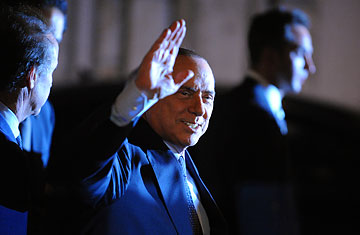
Italian Prime Minister Silvio Berlusconi waves as he leaves Palazzo Grazioli in Rome on Oct. 7, 2009
In his provocative 2006 film, The Caiman, Italian director Nanni Moretti imagines an explosive climax to the political life and times of Silvio Berlusconi. The film ends as the billionaire leader — devilishly portrayed by Moretti — is found guilty on corruption charges and makes a menacing declaration from the courthouse steps: "With my conviction, our democracy has been transformed into a regime, and all free men have the right to react against it in any way they see fit." As the fictional Prime Minister pulls away in his limousine, a mob sets the courthouse ablaze.
Such a scenario is, of course, the stuff of an anti-Berlusconi filmmaker's vivid imagination. But reality may be inching toward fiction. The Italian Constitutional Court's decision late Wednesday to overturn an immunity-from-prosecution law risks setting off a high-stakes showdown between the 73-year-old Prime Minister and an array of antagonists, real and imagined.
Berlusconi's center-right government had pushed through the so-called Lodo Alfano law last year. The law granted immunity for the country's four highest officeholders. The court's decision means the Prime Minister must now face outstanding criminal charges in three corruption cases that are already under way. Most notably, Berlusconi is accused of paying British-born lawyer David Mills to lie on his behalf during an earlier corruption trial. Mills, the husband of Britain's Olympics Minister, Tessa Jowell, has already been convicted in the case. Both Mills, who is appealing the verdict, and Berlusconi, deny the charges.
Berlusconi has plenty of experience fighting charges. He sarcastically boasts that he is "the most prosecuted" man in Italian history never to be convicted. His criminal record is indeed clean, thanks to a string of not-guilty verdicts as well as expired statutes of limitations and modifications to laws through his control of Parliament. In 2003, he became the first Italian Prime Minister to testify in a case against him, rousing a packed courtroom with a nearly hour-long defense in a Milan corruption case in which he was eventually acquitted.
Many Italians believe he is unfairly targeted by magistrates who feel they should step into the vacuum left by a feeble center-left opposition that cannot unseat Berlusconi via political means.
The legal decision comes as the man who once claimed to carry "sunshine in his pocket" has begun to resemble the bitter depiction in Moretti's film. Berlusconi is still fighting his way through a series of lurid allegations that began when his estranged wife accused him in April of "frequenting underage females" and has since featured reports of harem-like get-togethers at Berlusconi's residences and a prostitute who says she was paid to spend the night with him. Adding to his woes was a civil court ruling on Oct. 3 that may force Berlusconi's family-business holding company to pay a whopping €750 million ($1.1 billion) to archrival businessman Carlo De Benedetti in an 18-year-old case about alleged corruption in the takeover of the Mondadori publishing house.
If not quite Nanni Moretti, Berlusconi's current situation has all the elements of a Pedro Almodóvar film: A Prime Minister on the Verge of a Nervous Breakdown. Following the court's judgment on Wednesday night, he launched into a diatribe in front of television cameras accusing magistrates, "72% of the press," public broadcaster RAI, comedians, the court and the President of the Republic of being leftists who are out to get him.
The reference to the President, Giorgio Napolitano, whose head-of-state role is considered a unifying national symbol, was a particularly reckless accusation that risks costing Berlusconi support from moderates. But his hot-under-the-collar reaction is a clear message to his allies and adversaries alike that he plans to forge ahead, with no prospects of resigning or calling early elections. Not even the increasingly influential Northern League Party, which commands 10% support in polls and is growing in popularity, is interested in an early election, aware as they are that they owe their power to Berlusconi. Meanwhile, the center-left opposition is considered so weak and fractured that it may fear new elections more than anyone.
A guilty verdict in one of the corruption cases might knock Berlusconi out of office, though he has the right to appeal and try to hold on to power. Short of that, how else might all this end? Berlusconi's allies have increasingly alluded to a behind-the-scenes political coup they say is being orchestrated by a cabal of so-called poteri forti (strong powers) of Italian business and cultural élites who are allied with magistrates and foreign governments that are worried that Berlusconi has become a liability for political and economic stability. But even if there were such a surreptitious movement afoot to unseat the Prime Minister, any supposed "strong powers" from outside of Parliament would also require some sign of strength from within the political system. And even a weakened Berlusconi still looks mighty strong compared to the rest of Italy's political class.
